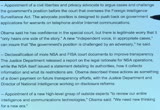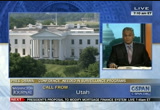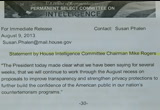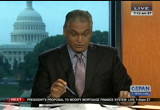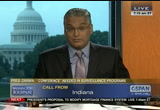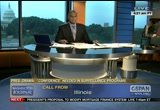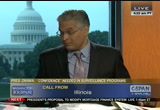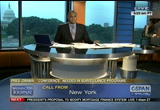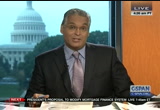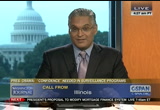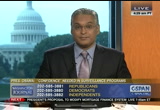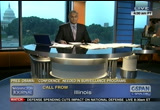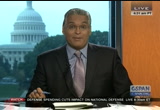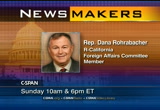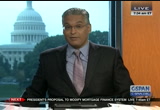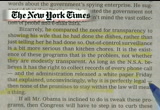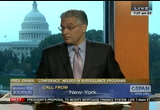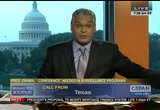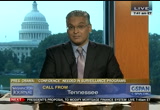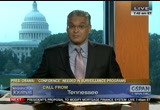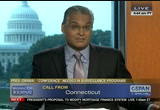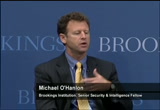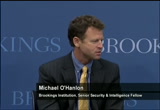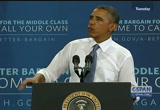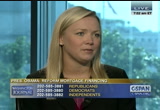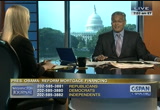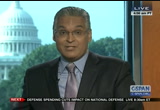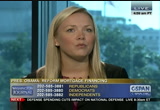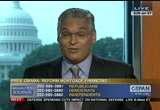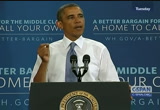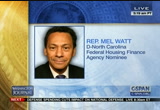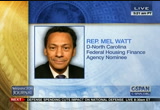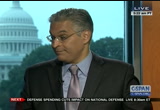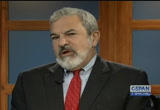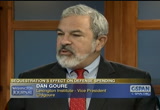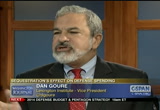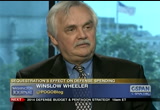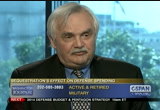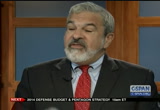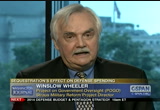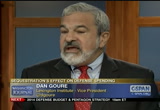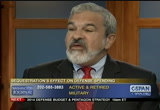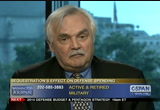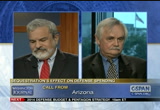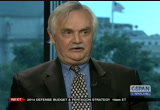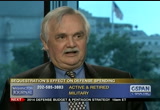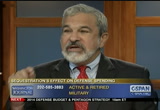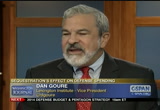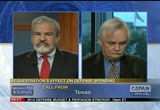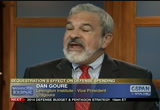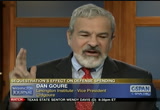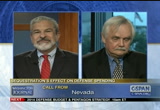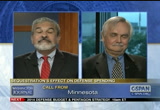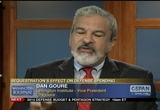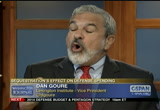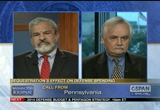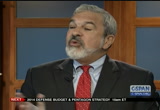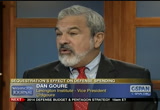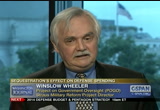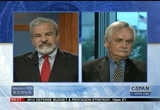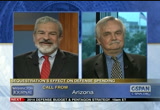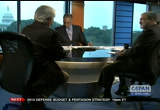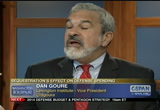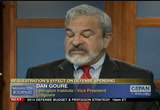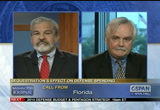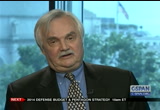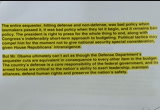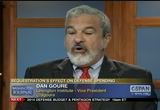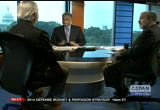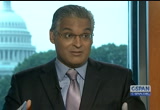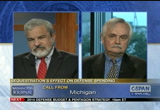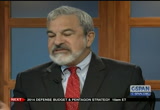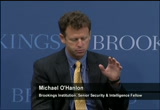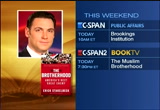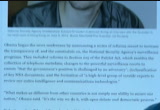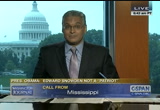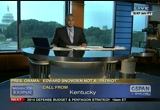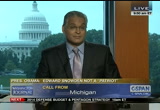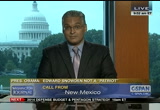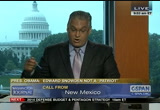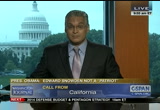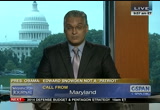tv Washington Journal CSPAN August 10, 2013 7:00am-10:01am EDT
7:00 am
on spending cuts under sequestration. dangoure joined by and winslow wheeler. ♪ washington journal" good morning. president obama addresses the disabled veterans convention in orlando, florida before heading on vacation. this is the president in a press conference yesterday, promising to reform the current nsa surveillance program. he listed a series of proposals. a advisory group released review of communication technology by the end of the year. the president wants the american confidenceave "more in these programs." for the first 45 minutes we will discuss the proposal.
7:01 am
what we are interested from hearing from you, will these proposals install confidence? here is how you can reach out to us this morning. it is -- social media is available to you as well. here's a listing of some of the proposals released yesterday by the president at the press conference at the white house. they include the appointment of a civil liberties and privacy advocate. he argued cases and challenge the government's edition before the court that --
7:02 am
7:03 am
information out there and reviews of the surveillance program that the united states program operates, hoping to install confidence of the american people. if you want to give us a call or comment, here is your chance to do so -- talkinghe president about the reasons for the reforms. [video clip] >> i am mindful of how these issues are seen overseas. american leadership depends on american democracy and american openness. what makes us different from other countries is not simply our ability to secure our nation, it is the way we do it, and open debates and democratic process. in other words, it is not enough for me as president to have confidence in these programs. the american people need to have confidence in them as well.
7:04 am
that is why over the last few weeks i have consulted members of the congress who have consulted this issue for many different perspectives. i asked the privacy and civil liberties oversight board to review whether our values come into attention. the numbers will be on your screen. this is richard from massachusetts, independent line caller:. -- independent line. caller: good morning. they do anything they want. they tell you a little bit of what is really happening. they have been doing this for years. air is no way we can find out. i even tried to find out what the cia budget is, they say that is confidential. how can a budget be confidential? we pay taxes. i do not trust the government one bit.
7:05 am
everything is secrecy in this country. we have free people. what would instill confidence in these types of programs? caller: the only thing that can be done, in my point of view, i know you cannot tell us a lot of some kind of picture of what is really happening. they hire people for the cabinet get a private company in there and find out what is wrong with the system. are talking about the idea of the president wanted to put more confidence -- gather more confidence about the surveillance programs. let us go to mike. he joins us from philadelphia pennsylvania.
7:06 am
my only comment is that a lot of these things need to be -- one of the main places i have a concern about government availability online, the government in general has not transition quickly enough to protect the liberties that we enjoy in the real world as we do in the virtual world. to instill confidence in the american people, one of the things i would do, it would have to be the judicial branch to extend the fourth amendment to things that happen online. i think americans understand that government protecting their privacy would go a long way in restoring their confidence, in any of the institutions in general. you think about this idea of the government knowing what
7:07 am
is going on phone or internet wise? >> absolutely. i do not think it affects my behavior. i am just a normal citizen. i definitely do think the government could be listening. would find my conversations their industry -- very interesting. i do not think they are showing enough that there working to defeat terrorism, as well as protect civil liberties. i think they just need to show that they care about civil liberties. us fromleman joins tulsa, oklahoma. the government surveillance does not have any credibility because of the irs scandal. a government agency has information on people if you
7:08 am
think the obama administration any information on their political enemies, that is all about politics. that is the misuse people are concerned with. the terrorist surveillance program is a good program. the problem is an administration has lost all credibility with the american people, unless you are a socialist. that is the big issue. from "the washington post," --
7:09 am
good morning from massachusetts, democrats line. you are talking about the president wanted to install more confidence in surveillance programs. caller: i think people should be confident with what the government is doing. do not question it. host: why not? caller: surveillance is necessary in today's world to
7:10 am
keep people safe. stephen joins us from utah, independent line. caller: i heard the president say that the government is not listening to your phone calls, i believe that. what they are doing and what they can do is they can record all of your phone calls and they will go in there and do a search of it they can do a keyword search and pull up all of your phone calls just by looking at the one area. the voicemail is e-mailed to me as a text file. at is one thing they can do and they are going to be doing it now. they are going to be checking on everybody. host: as your confidence level, how would you define that? caller: very little.
7:11 am
it reminds me when they talk cannothe 666, when you do anything without approval. host: are there steps the government can take to improve that confidence? can -- as far as i far as i am concerned government turned a 10 commandments into tent inconvenient truths. chairman mike rogers put out a statement -- the president is making a series of reforms is today. why andce is the reason trying to get more confidence from the american people.
7:12 am
we are asking you about that concept. if you want to join us on the phone -- this is stephen from massachusetts. caller: i am grateful for the president to come out and say that we are not being -- our calls are not being surveilled. i'm thankful for a government that protects me from al qaeda and terrorists. of these intelligence and gathering information can be used to aware the public. people want to say they know what the government is doing, they don't even work for the government. when the government says they're doing something for my own good, i have faith in my constitution to believe that something is being done to protect me from some foreign country that wants
7:13 am
to take me over. host: when it comes to the reforms the president proposed, a good step as far as putting out there how these operations -- these government programs are operated? keep theink that will government's activities from going too far? carefulthey have to be what they do, of course. at least they are heightening the awareness of people. people blow it out of proportion. it is all you hear about. i did not believe it is going on at all. i really don't. that people are going to get caught for something they do wrong. they should be caught. that is my feelings on the whole thing. host: that is stephen from massachusetts. this is from "the wall street journal," --
7:15 am
confidence that possessing and having this kind of information and this much information -- i think the temptation to abuse it is far too great. amount of given the money and how it influences our politics. host: anything in your mind that could change that? caller: probably not, especially given how so secretive they are about everything. i do not think so. completed have to do a -- on help which the are how much they are classifying. host: more transparency, then? caller: much more. i do not think they are willing to give up that much
7:16 am
transparency. yesterday,resident talking about transparency issues. we have a tape from yesterday. he talked about the intelligence community and how they will attempt to make surveillance programs more transparent. [video clip] >> we can and must be more transparent. i've directed the intelligence community to make public as much of these programs is a cam possible. we can go further. on my direction the department of justice will make public the legal rationale for the collection activity under section 215 of the patriot act, the nsa is taking steps to put into place a full-time civil liberties and privacy officer, and release information and details of its mission and authorities oversight. the intelligence community is creating a website that will serve as a hub for for the transparency. this will give americans and the world the ability to learn more about what our intelligence
7:17 am
communities does and what it does not do. the president from yesterday, off of twitter. it edwin chorused in saying -- edwin christian saying -- republican line. fact that the of cover meant -- the government does monitor your telephones. we both received texts from homeland security saying that they are monitoring our phone calls. all of these credit -- all of these people that think the president is protecting you, how
7:18 am
come we can't protect our own borders? host: what about the proposals he listed yesterday? caller: that is more lip service. that is all we have ever gotten. he will tell you what you want to hear them and walk away and , thatese drones out here is how he gets away with it. host: to recount some of the proposals listed yesterday. new talks would go on with congress to revise section 215 of the patriot act -- joanne is up next, sterling, virginia, democrats line. there is ahink couple of issues. i think president obama has gone
7:19 am
in the right direction as far as making the court had more adversarial. got -- we lost focus as far as the balance between security and upholding the privacy of the constitution. thisthink obama has got absolutely correct. there has to be leadership in congress. if you're depending on just one directives, make then it ends with the president. this has to be long -- this has to be more long-term. we can go back to having complete privacy and security and still live in an internet world, that is over. pandora's box is open. i do think we have to be very there has to be
7:20 am
7:21 am
what i have garnered from all of these calls is that many people do not listen to what is said by the president or whatever newspaper. they have an idea. i think it is closemindedness. this president is doing very well in answering all the questions and all of the categories. there is a willingness by this to see through all of the problems and react or
7:22 am
7:23 am
and he up next from the republican line. -- andy is up next from the republican line. caller: it is amazing people are so conditioned to love big brother that they are willing to give up privacy. privacy is based on the biggest lie of the mall, nine/11. want to talk about. the fact it makes people uncomfortable does not change the fact. the top part of the building does not crush the lower part without slowing down. i get it makes people uncomfortable. how many of our freedoms are we going to give up before we -- democrats line, jim.
7:24 am
caller: i have absolutely no confidence in this program because i have no confidence in our government. sooner or later it is going to be corrupted. going to start using it for their own purposes and taking away more of our rights and more about privacy. they should be targeting al qaeda directly. it is not a good thing. host: the business section of the new york times this morning, taking a look at e-mail services -- it says the shutdown of two small providers on thursday illustrates why it is so hard for a -- for internet companies to challenge --
7:26 am
was thinking there. there is absolutely no transparency whatsoever and i do not think this cop -- this topic ifld be discussed as of now it wasn't for whistleblowers like edward snowden. they would still be behind closed doors on this and the american people would have never found out about it. host: what should we do going forward? caller: government needs to tell the truth. would've they been doing exactly up until this point now? agenda --ir future what if their future agenda is with the program? we go to and on the republican line. have a feeling about i am sureillance --
7:27 am
they have done it for a long time. there is a lot of people that i to -- that the need maybe need to be under surveillance. idiots get on facebook and put everything on their life on their. i think it is absolutely ridiculous. don't usesume you facebook. what about cell phone or computer use? i use my cell phone and that is fine. i know it can be picked up. there is nothing in my life that i do wrong. host: you suspect this might be going on a long time.
7:28 am
do people have the same stocks you do or are some ok with the practices they have been hearing about? what about those you communicate with on this issue? with,: the people i work some of them probably go along with it but there are some of that would with probably not like to be surveyed. host: because -- caller: their past life. host: we are going to hear from another. this is from maryland on our democrats line. before you start, why don't you turn down your tv so you can talk with us. one more time, go ahead. we will go to tom. jabari, democrats line. i think not trusting a
7:29 am
government is more of a trend than a problem. mysterious is dealing with terrorism, it is more complex than people think. it is not like going to war with the country. is a a corporation, it program. when you go to war with terrorism, they can be anywhere. conversation,our it cannot be as important as innocent people dying. host: can you expand on that he e -- on that? caller: most people do not even have any evidence to show that they know what they are talking about when they say that the government is doing stuff behind our back. on ourhat is jabari democrats line. the previous caller mentioned edward snowden. a story out of mclean, virginia this morning, saying --
7:30 am
7:31 am
on the war on terror. now the same people are willing to be absolutely un-american and add surveillance to this level on on americans. boston, theys in did not catch those two guys, even though there were so many signs out there. if you are willing to give up your freedom and have your life looked at to this extent, quit drinking the kool-aid. you are all being loyal to obama, you're not being loyal to america. host: dennis off of twitter -- i want to point you to our newsmakers program that will appear sunday at 10:00 -- a member of the foreign affairs committee did and some of the
7:32 am
discussions with reporters, he talked about russia and the nsa program that attracts mated data about american phone calls and e-mails. here's what he has to say. [video clip] >> the fact is we have approved the following of terrorist communications from overseas. even those communications that go into the united states. when it comes to phone calls of every single american, which is what we are talking about, they do not need to keep tabs on everyone of us and what we are doing in order to support a terrorist attack. host: newsmakers takes place tomorrow at 10:00. guest is a member of the foreign affairs committee. independent line, california. caller: one thing a lot of
7:33 am
people are overlooking is is that i do not know if president obama or even many people in our government can really vouch for what is going on with these programs. a lot of these programs are being conducted with private corporations. a lot of these people are private contractors. some of them are transnational agents. if any abuses being taken place, where is the oversight going to come from? host: how much should there be e caller: -- should there be? caller: there should be enough for american citizens to have recourse. host: off of facebook --
7:34 am
bruce is ill and -- worse is from illinois on the democrats line. -- bruce is on the democrats line from illinois. this is more open than it has ever been. the irs, checking on tea party groups, and tea party groups taking their name from people willing to destroy are pretty to avoid paying taxes, that would cause a reaction to me. are going to try to avoid taxes and maybe we ought to look at them. host: from twitter -- up next is bill from illinois, republican line. good morning, go ahead.
7:35 am
caller: i have two comments, one about transparency. we have no transparency about benghazi or the irs, why should we believe we should get transparency about the nsa. this is absolutely ridiculous. they are going to take obamacare , and they have done all this to different people within the irs. what if you do not want to pay your fine? what is the irs going to do to you then am a to come back and do it? i would like to see obama and all of these phony scandals, i would like to see obama stand before the families of the people who got killed and told them that their deaths were due to a scandal. host: the new york times editorial board this is out there this morning --
7:37 am
i am in new york, and i firmly secure that we need to our country in any way possible. if it means listening to phone calls, by all means go ahead and do it. friends in thef world trade center and i to not want to see it happen again. outsourcing our intelligence to private contractors is a beecher mistake. it -- is a major mistake. you lose total control of it. of this.n stay on top you have people like snowden, who is a traitor. this country needs to be aware of what kind of information is
7:38 am
going around. going to't, we are have another problem and another attack. i am will not willing to give that up the at -- i am not willing to give that up area -- that up. according to the papers -- willie from fort worth, texas, up next on our democratic line. caller: we complain about what the government does for our protection. if you want to get on a computer
7:39 am
and by a server, sign up with all the information they need from us, this and the other marketing companies -- there is nothing being said about how they abuse our privilege to one another. i agree with what obama is doing. a program that was started for the george bush administration to protect us from the terrorists. createdthe scandal they by the republicans so they can take points from the democrats won the elections come. from twitter says what is needed is a clear personal data law. kirk is up next from pittsburgh, pennsylvania. on the democrats line -- caller: good morning. would 100% advocate for this nsa program and others like it, if only they would truly concentrate on the real terrorist. this is to belittle what
7:40 am
occurred on 9/11 or happened at the boston marathon, but there are tens of thousands of americans that die every year. tot is due to corporate ceos pollute our rivers and streams and even our ocean. did in the gulf of mexico, and here in pennsylvania we have more super clean up sites. the name ofdone in greed versus gluttony. relate that to the surveillance program. survey these corporations, who are murdering tens of thousands of people , get the goods on them, arrest them, try them, and sentence them or execute him for
7:41 am
the crimes they are committee. host: will from columbia, tennessee. caller: good morning. thank you c-span for the work you are doing. i appreciate all three branches being able to see what is going on in their government. did notle in america have the confidence in their government. all three branches have failed our people. all major reforms have been taken place over the eight years . the problem stems back to world war ii. look at the history of what is going on in our government, i heard there was a secret organization. there was also organizations coming up that were powerful from the corporations in
7:42 am
america. these things that should be transparent to the american people, they should be accountable. what they are talking about is allowing another arrow worm and nixon was accountable -- another era where nixon was accountable. if the government is going to use a security and surveillance on american citizens, why cannot we turn this around and put the problems? we their have major reforms, taking place in america. for the good of american citizens? -- of american citizens. host: next is alice from tampa, florida on the independent line. allison, good morning. felt that obama was
7:43 am
actually superficial in what he said. he didn't go into the issues that need to be addressed. i heard a few other colors say they do not have a problem with being surveilled. i think we need to realize that it does not come down to what you have for what you have to hide. it comes down to the fact that it is a constitutional right. was: you said he superficial yesterday. where could he have gone deeper? was going toid he make changes to the pfizer court. i think he should repeal the patriot act completely and completely reform the surveillance that we have right now. take one more call. this is on the democrats line. president obama -- he is
7:44 am
the us president. i agree that he is supposed to protect our country. he is the president that found bin laden. no other person was able to do it. all he does his work for people, work hard. and congress is against him. they tried to give him a hard time. he is the best president. he has done a lot. and he is trying to protect people from terrorism. host: that is the last call on
7:45 am
this topic. we will talk about the mortgage industry, president obama made a series of proposals that target the mortgage industry and its practices earlier this week. they're going to discuss those proposals with margaret chadbourn. later on, a discussion on how the defense department is faring under sequestration. our guests will be winslow w heeler and dan goure. we will take up those conversations when we continue in just a moment. ♪
7:46 am
>> adrian fenty and vincent gray faced each other in one of the most expensive elections in history. adrienne rate $5 million. 1.2ent gray raised only million dollars. shortly after great took office philemon brown told the .ashington post he was paid federal investigators soon discover that much of his story was true. they also uncovered a bigger secret, the shadow campaign. >> basically you have a campaign that was going along with the regular campaign. and then you had another set of folks who were in an office greatnext to the
7:47 am
campaign. during the campaign, there is so much going on. you had several workers actually -- actuallyg complaining about the other workers because they felt they were getting paid more. it was a lot of confusion about who is paying them. startedater, folks putting things together, when federal investigators began asking questions. they realized, wait a minute, the folks who were next door, we cannot find any record of them in the campaign finance records. how did those folks get paid and who was in charge of them? stewart looks at corruption in d.c. politics. >> if the japanese want to fight over the san cocco islands, let them do it. we are better off sitting out.
7:48 am
if we have a smaller military we are more disinclined to get involved. i do not want to fight the chinese over the senkaku islands. if you look at where we fight and where we don't, i do not see a correlation between higher defense budget and greater likelihood of intervening. the world wars be can when we were unprepared. the korean war began when we were unprepared. the vietnam was a little more collects -- more complex. we fast-forward to the reagan years, in many ways they are people, seen as the golden years of american defense policy because we built up the budget and we didn't really use the military. isn't that a wonderful outcome? i am not saying this is all ronald reagan's great judgment that led to that, there were some happy circumstances as well. it was no correlation between increasing the public -- increasing the budget and increasing the declivity to
7:49 am
intervening. >> budget cuts on 10 a.m. eastern. of thetv, the history muslim brotherhood and its influence across the middle east. and on c-span three's american history tv, a look at interment of japanese americans during world war ii. at 4:15. "washington journal" continues. chadbourn is a correspondent from reuters. we are taking a look at the mortgage industry and others. welcome. he for we got into specifics, what was the president -- before we got into specifics, what was the president trying to accomplish? guest: he laid out his proposal from four years ago. he is trying to say the housing market is recovering, let is
7:50 am
moving so long. it was an economic speech. he is open to debate on what to do with housing finance reform, it has been stuck in congress and not seen as going anywhere. lawmakers prepare to get into that debate. host: what is the snapshot of the housing market look like these days? guest: right now you are seeing a housing market -- it is really benefiting from a boom in home sizes. -- home prices. we have seen a spike in home prices since the collapse several years ago. rates are at historic lows. rates aregage starting to rise. there is a little bit of a fear of what will happen in the months to come when the fed stops buying mortgage bonds and helps keeps those rates at his door close. -- historic lows. things are looking good. those concerns in part
7:51 am
of what the president proposed or regulatory actions overall? guest: i would not say that is to do with where the housing market economy is going. tackles together with congress will take years to implement. we don't see a bill could be done until 2015 because of the wide differences that exist between house republicans and senate democrats and some senate republicans, as well. ast: the president laid out speech on tuesday. here's a bit. [video clip] >> if we help qualified families get a mortgage, if we reform our immigration system, we rebuild the hardest hit communities, we make sure that folks have a decent place to rent if they are not yet able to buy.
7:52 am
all of these steps will give more middle-class families the chance to either buy their own home now or eventually by their own home. it is going to give relief to responsible homeowners. it gives more options to families were not yet ready to buy. all of that is going to improve the housing market and it will improve the economy. with the ideatart about helping to refinance mortgage, what is behind that proposal? residentat you heard obama say is a repeat of proposals he put out there before. he wanted to get refinancing legislation through congress. it has not got. . -- not got there yet. there are things he has already been doing through executive action. we will see how congress picks up in the fall, whether they are ready to bring forward finance reform -- bring forward free
7:53 am
finance legislation. -- refinance legislation. they hope to put dollars back in the hands of homeowners that want to take it vantage of low rates. as we talk about those mortgage rates, which were about 3.5% in may, are now closer to 4.5%. what is the problem behind the way they see it to? guest: some republicans see it as an economic stimulus plan. it is more federal involvement that they would rather not see in the housing market. they want to see more private capital come back in. they don't think homeowners need that at this time. we will talk about other things as we go through the morning. if you want to ask a question, you can do so with these numbers --
7:54 am
if you want to send us a tweet, it is @cspanwj. you can also e-mail at journal@c-span.org. fannie and freddie, what are they and what are the proposals? guest: they rt into how our financing -- are housing system exists now. what the president wanted to do is somehow dismantle and get rid of these firms. they back all of u.s. home loans. they buy loans from lenders, the apackaged them, and then number of securities are sold to investors. the government guarantees that insurers and interests and
7:55 am
principal will be paid on those lonans. the are the linchpin of what makes a 30 year fixed-rate rate mortgage available to most consumers. host: during the financial crisis we are propping them up with money. caller: we are still seeing that money go out these two firms. these firms have taken close to 100 $88 billion in taxpayer funds. not ablethey are to fully repay that loan from the government at this time until something is done to change the terms of the bailout agreement. host: both of these firms are bringing back millions to the treasury department. . they are making a quite sizable profit. they pay back the federal aid in the form of a dividend payment.
7:56 am
it is just interest, basically, on what the u.s. has given their support to keep them afloat. does it complicate the off?ts of spinning them guest: it is clear their profitability will tangle the debate, somewhat. you have investors who have andied up on capitol hill to lawmakers saying, let's make these firms independent. they want to see some return on the investment. shares of fannie and freddie, with the hopes that they will be on their own one day. our first call is from alan in orlando, florida on our independent line. think the crash in 2008 would not have happened
7:57 am
if fannie and freddie did not back most mortgages. thise private sector and government sets of standards, the private sector is going to be held to that loan. they are not going to be able to be bailed out. the loan is going to be set by the government and the standards are going to be set by the government. that is the problem. either the private sector sets the standard for the government does. we cannot have a quasi-situation there. host: what you mean by low standards? the,r: five percent down like the president suggested. before it was no money down. were promoting the housing thing, not everybody should have a house. the government needs to be out of it and let a real market handle the situation. they back it with taxpayer money. you. thank
7:58 am
obama laid out this week that he does not want to see fannie mae and freddie mac play the dominant role in backstopping the mortgage market. and simmers have benefited from this backstop. it is now in the hands of congress to debate whether or not there should be such a sizable role for the government. host: what has been the reaction from those in the mortgage industry and the home industry to the psyche of spinning off fannie and freddie and making them completely separate? thing everyone can agree to is that fannie and freddie need to be dismantled. they want to see an end to these two companies. they do not want to see them operate in the way before the housing crisis. the reaction that is playing through this week is six months
7:59 am
ago we were not even thinking about getting housing finance reform through congress. and now it looks like it is tangible. real estate brokers, home builders, bankers, they are all going to coalesce and try to lobby to congress on how to best save this new system going forward. host: the bill you are talking about is reflective of what the president proposed? guest: what the president put it very much mirrors what a bipartisan group of senators have laid out. that -- by mark warner of virginia and pop corker of tennessee. it sets up a catastrophic backstop for mortgages in times of crisis. it does get rid of fannie and freddie. host: democrats line, janet,
8:00 am
good morning. waser: on the stuff she just talking about, i tried that refinancing the government put forward. nine months into the refinance, i was told to get out of my house. i think the government does need to step out of it because it has made a bunch of promises and .isleading people i've lost my car and my job. they need to practice more on getting these jobs back.
8:01 am
>> these are the programs that assist homeowners. how effective have they been? guest: they are still in existence. obama put out his key signature program in 2009. and that intended to rework mortgages for those who are behind on payments or perhaps under water. and the administration has retooled that program and made it easier for both lenders and borrowers to participate in. so we've seen it morphed. now you have to look at it as a benchmark that was established to reach 4 million borrow whers
8:02 am
it was unveiled in 2009, and here we are in 2013 and the number is 1.2 million borrowers who have successfully gone through the program. so if you're looking at the expectation versus the participation, some might argue that it hasn't been as successful as they had hoped. host: you talked about rise in home prices. where are we as far as foreclosures? guest: there's not as many foreclosures at this time. the market has been snapped up by investors, where they've taken foreclosed properties and turned them into rentals. host: brad is up next on our republican line for margaret chadbourn of reuters. caller: thanks for taking my call. i'd like to ask margaret what her take is on the repeal of the glass kegell act and whether it would be beneficial to get --
8:03 am
and i'll. guest: a senator in congress has put up glass segal 102, so we'll see the debate going forward. host: it was greedy banks, not the fed who created these mortgages and banks who packaged them as viable securities. the banking role in the housing industry. what have we seen as far as efforts post the financial crisis? guest: banks are a big part of the buying system. fanny and freddy operate as a conduit between lenders and banks, they sell the home loans to banks and financial institutions to provide liquidity of the housing market. a lot of people like to shift
8:04 am
blame on the banks for being greedy or putting out pieces of paper that were probably not meant for those to be using as borrowing opportunities. host: crosby, north dakota, from the democrats line. hi. caller: hello. thank you for c-span i watch it every day. i get up with the alarm clock just to do it. the thing that bothers me the most is to watch the commercials on tv that promote this mortgage thing for older people that they can still have their home and live like they want to, they don't have to worry about mortgage payments or anything, and they're promoted by -- so can you address that and tell me whether or not this is a problem, or if this is the way it should be. thank you so very much, i love
8:05 am
c-span. bye-bye. guest: flo what you are probably talking about is something called the reverse mortgage program. and there are plenty of commercials on television that do promote it. it's basically part of the federal housing administration's tools to provide mortgage insurance. it mainly goes to those who under their retirement years and it's an option that's out there, and the f.h.a. is doing its best to make sure that program operates smoothly and that it provides what it needs in the way of support to homeowners. host: 5 million existing home sales according to fanny mae and freddie mac. new existing home sales at 5.5 million. the median new home price is 271,000. the median exiting home price is $193,000. and the average rate for 30-year fixed rate mortgage is now currently 4.4%. a lot of talk from the president
8:06 am
about this stability of the 30-year mortgage. talk a little about the philosophy behind that. guest: the 30-year fixed rate mortgage is definitely seen as what makes american homeownership possible. it's basically a unique part of our borrow are system. not many other countries have this longer term loan available. and consumers really want to see that as part of the home finance system going forward. it's being debated if you bring the government out of the mortgage market, how much that 30-year rate fixed mortgage will cost, and how widely it will be available. as i said earlier in our program, fannie and freddie really do provide the liquidity to make this product available to most consumers. host: so we still see people in the shorter term mortgages and the variable interest rates and that sort of thing?
8:07 am
>> lending is tight right now, that's a little pent up demand. the economy is doing better. rates are on the rise and people want to get into the market, but yet banks are still a little bit unsure about who they are going to loan to. host: bob is up next from north carolina, republican line. you're on, go ahead. caller: how are you doing. i wanted to comment on the fanny mae and freddie mach going private. i've been in-housing for 25 years on multiple homes, rental properties, flips. the problem is that it's never going to go private. if it does go private, it will only fail and go back to government. and the reason being is it's not run like a business. and the politicians, republican and democrats alike, they're not good at business because their
8:08 am
occupation is on public opinion. and you can't run things on, the way they have to be run on public opinion. their hand are tied. so the fanny mae and freddie mac deal which was a big supporter in the 2008 crash when homeownership became a right not an entitlement, it just gets out of hand. so doing foreclosures, compensating people for good work, letting people go for bad work, these are things the got cannot do and keep public opinion in a positive manner. so they should just simply stop fanny mae and freddiemac and stop it where it's at, and let the -- host: okay, caller, thanks. guest: bob mention that we should just put fanny mae and freddiemac aside and put it in the hands of private capital.
8:09 am
that type of change is going to take a great deal of time, even the bills that exist right now for change, see fanny and freddy being liquidated over a five-year period and that has market participants worried in itself. it will be a slow process because they are so en trenched in our housing system. host: he says it's not run like a business, it's based on public opinion. guest: fanny mae and freddiemac are in the hands of federal conservatorship. any step they take, any new business product they put out, anything that they're doing is done with the advisement of this regulator. host: and the president again speaking directly about these two entities on tuesday, here's what he had to say. >> and that's why i want to lay a rock solid foundation to make sure the kind of crisis we went through never happens again. we've got to make sure it
8:10 am
doesn't happen again. and one of the key things to make sure it doesn't happen again is to wind down these companies that are not really government but not really private sector, they're known as freddiemac and fannie mae. for too long these companies were allowed to make huge profits buying mortgages, knowing that if their bets went bad taxpayers would be left holding the bag. it was heads we win, tails you lose. and it was wrong. along with what happened on wall street, it helped to inflate this bubble in a way that ultimately killed main street. so the good news is right now there's a bipartisan group of senators working to end fanny and freddie as we know them. and i support these kinds of reform efforts, and they're following four core principles for what i believe this reform
8:11 am
should look like. first, private capital should take a bigger role in the mortgage market. host: margaret chadbourn, anything to add? guest: the president just laid out that the housing recovery while coming along still needs some support from congress. and in terms of what he wants to see them do to shape how the housing finance system goes forward. he wants to produce the private role in the housing system and see more of private capital come back. host: charleston, south carolina from valerie on our democrats line, good morning, go ahead. caller: good morning. my call is in reference to what ms. chadbourn said, she's right about the investors making gains. the negative is -- good morning. host: good morning, you're on. you have to stop listening to the tv and just talk to us.
8:12 am
caller: okay. my point is the negative is that the brokers took advantage before post 9/11. the caller who was crying out -- host: caller, let me put you on hold. see if you can turn down our television set and we'll get back to you. let's go to don in new mexico, the i believe line. caller: good morning. i'd like to clarify the amount of money that came in as a result of the recent access, the recent cash that was given to the federal government. fanny mae paid $10 billion and freddie mac paid $5 billion. and the goal is to make these companies more like the fdic where they are just insurance backers. so this market to go all private, i think if you look at the investigations into the housing market which you would discover is that the early loans that were created into mortgage
8:13 am
backed securities and collateralized debt obligations, went directly from wall street to the rest of the world. and people should understand then those loans went belly up. people should understand that fanni expe freddie do not originate loans. let me say this again, fanny and freddie do not originate loans, they buy loans. and people should understand that the rating agencies who were in charge of making sure that these loans, you know, they had real backing, they failed in their task. so fannie and freddie were at the end of this loop, not at the beginning of this loop. host: caller, thank you. the rating agencies. guest: in terms of what he said, he said that he wanted to make a clear distinction that fanny mae and freddie mac do not originate loans, and in terms of the rating agencies they're not sure
8:14 am
that they play a part in the original nation of loans. they do give ratings to certain mortgage backed securities, these home loan bonds, both private label, m.b.s. and government backed m.b.s. host: valerie, let's try you again, democrats line. caller: okay, sorry about that. my reference was in to miss chadbourn that she is right about those investors making gains. the negative is that the banks, that the brokers took advantage before and after post 9/11. the caller who was crying about losing her home was very legitimate in her emotions, the making home affordable program, which i'm engaged in right now, as well as other agencies, are not really working with homeowners to secure housing because of the recessionary bubble that occurred.
8:15 am
host: can you tell us, valerie, about your experience with the making home affordable program, what it's been like, the process, has it's been clear to you, has it's been complicated? give us a sense of what it's like for you. caller: it's very difficult, because my income is in place. but because of the backing on the mortgage, the government, not the government, the government gave the bank the money, my loan happens to be part of the mortgage oversight scandal. including those five things owe banks that were involved. so because of that my loan was backed up, never answered to. and although i'd want to pay back my loan under the hud provision, it's just not clear. i have a suitcase full of files and i'm sure there's many homeowners within this country that are faced with that same challenge. host: would you mine telling us the amount of your loan?
8:16 am
caller: $115,000. host: so as far as communication to those about this program and what you try to get help, what's that been like? carp very difficult, very unorganized. i would name the bank, but i just don't want to say on national television, but they're a part of that mortgage oversight scandal. guest: what valerie is speaking to is the 25 billion settlement between the justice departments, state a.g.'s and five of the biggest banks on wall street. and that happened after it was discovered that some of these banks were involved in foreclosure abuses where they were so-called robo signing documents, not looking closely at foreclosure procedures, and so homeowners like valerie are now benefiting from some of that settlement. part of the settlement agreement involved giving money back to borrowers, part of it involved helping borrowers through
8:17 am
principle mortgage beliefs, so we're still seeing that evolve. host: she talked about complications. have you her these kind of things before? guest: right, so the administration did bring in someone to oversee how that settlement is being played out and how that settlement is reaching its goals, how these banks are progressing and what they need to do. so every quarter will probably be getting an assessment on how the banks are performing. host: joe is up next, from iowa. republican line. hi. you're on, sir, go ahead. caller: hello. i've been watching the show for years. my grandfather built low income housing, well not low income, fixed income housing, and he always told me that you should
8:18 am
never take out a loan for more than one or maybe two times your yearly income. so you can afford the home. i had two kids, and realtors were telling them they could qualify at up to five times yearly income. well, plainly these people couldn't afford this stuff, and it was, the part that bothers me is the realtors were heavily involved in this whole mess and yet they haven't gotten a scratch out of the deal. that's all i got to say. host: anything from that? guest: right now regulators are taxed with ensuring that we no longer see these type of products, these no-doc loans being given to borrowers. there are certain standards that are being put in place, new mortgage rules being written that basically ensure that a borrower is able to repay their mortgage. and banks wouldn't be making loans without meeting those
8:19 am
standards. so i think joe will find that going forward there's been definite pressure on banks, on lenders to make sure that they are following these new mortgage rules. host: there's a story in the hill about the president's weekly address in which he called on congress to confirm his nom he for the devment housing and urban development, to boost housing value as cross the country, confirming represent i mel bought he says will protect americans from unstable housing loans, according to the president of the united states. first, tell us about the nominee. guest: right. so obama nominated democrat from north carolina, congressman mel bought, he's a member of the house -- watt. he's a veteran democrat with plenty of experience in terms of consumer problems. he's done a lot with the black caucus. mel watt, his nomination has
8:20 am
been seen as an uphill climb. obama nominated him this past year, he was hoping for a vote before congress went into recess this august, it didn't happen. so we're seeing it pushed back. and the president really wants to see mel watt put in place because that agency that oversees fanny mae and freddie mac has been operated by an acting director, and that acting director has been there since 2009. and the administration and the acting director are sometimes at odds with each other on how to best move forward and help homeowners. the administration at times has wanted to be more aggressive in how it helps with the housing crisis, in particular it really wanted to do, like i mentioned before, the principle writedown program which would involve helping under water borrowers get current on their loans by slashing some of the principal that's on the loan. and ed demarco was against such
8:21 am
a program, and nixed idea last summer. so while watt's nomination didn't get a vote before the recess, there's still some hope in the obama administration, and advisors are pressing for congress to make a move. host: you said it's an uphill climb. why is that? guest: people don't want to see a political appointee put into the place of what is an independent regulator is that overseeing fannie mae and freddie mac. the republicans see it as a way for the obama administration to get its bidding done when it comes to these executive actions that they are looking for to help homeowners. and frankly, mel watt, some actually question his ability, his technical expertise. you often hear republicans refer to him lacking the technical expertise to oversee fannie mae and freddie mac. demarco has been running fhaa for a while, he knows the ins
8:22 am
and outs of the government sponsored enter surprises and how they operate and there's concern there. host: the technical expertise as far as running a large organization, or other things? guest: technical expertise involving what fannie mae and freddie mac do. they have a tremendous part in making sure the housing system is liquid, and they are con flex in what they do. they buy loans, they repackage them and hold some on their books and sell some as securities to investors. there's a lot that goes on. it's not necessarily a big agency actually fhfa is not as big in numbers as you might expect. host: jack is up next from iowa, he's on our democrats line. hi. caller: hello. my question is, how can you fix something if you don't know what went wrong in the first place? in 2002 i remember seeing a couple republican congressmen complaining about fanni expe
8:23 am
freddie and they really hated it, and my perception is that between 2004 and 2006 george w. bush sort of sabotaged fanny and freddie by letting the bankers go wild and letting the private system handle everything. i'm wondering what margaret's thought is about what went really wrong. guest: thanks, jack. i think you hear republicans place a lot of blame on fanny mae and freddie mac for some of these affordable housing goals that they operate under. and they often say that what led up to the housing boom and bust was fannie mae and freddie mac oversetting some of these affordable housing goals, so that might be part of the criticism you just spoke to. host: carl from virginia, the republican line. caller: good morning, sir, my name is carl from fredericksburg, virginia, and i did work for fannie mae and i
8:24 am
started the mortgage backed security program, and i want to say that the whole process of dealing with fannie mae is in error. in fact, they have switched all of the liabilities, all of the bets that -- debt that fannie mae owed to taxpayers, that was done by paul son in 2008. prior to that, fannie mae issued all its debts and depend tours, which were owed and paid by fanni mae, not the federal government, and this is what's concerning the president, republicans and the conservative people, that taxpayers should not be liable for the debts of fannie mae and freddie mac. now what can be done and what should have been done was the fed should have loaned money to fannie mae and freddie mac. they would have repaid back all that money today and things would have been straightened out.
8:25 am
keep in mind that fannie mae has over 2,000 contracts with people all over the country that do develop these loans. they produce these loans, and fannie mae is the secondary market. 55 congresses from 1954 to 2008 have approved of what fannie mae was done. but this was reversed by this administration and what the president didn't say in arizona was that it's his administration that put all the liability on the taxpayers, by putting them in the conservatorship, and that changed the whole scheme of things of how fanni mae should operate. the solution is to bring them back into the government, do not pay off these stockholders that have been speculating in fannie mae stock. why didn't the treasury take all the stock back into this? host: so the notion what the president seespinning them off into totally private entities, what do you think about that?
8:26 am
caller: well, that was done in 1968, and it was done when the president of fannie mae was making $38,000. they do operate a great entity when they are in the government, because the congress cannot influence them. when they're in the government they run an ethical system throughout the country and they have been lauded for years and years and years but all of the the work that they have done by the home builders, the realtors, and mortgage companies, and all of the people that relate to fannie mae. but back in the government we will establish a secondary mortgage market that has an ethical system operating throughout this country and will not upset all the 2,000 people that now do business with fanne mae and freddie mac. host: carl, thank you very much. guest: i think the president made it clear this week that he wants to see fannie mae and freddie mac go away. that
8:27 am
there's going to be a new framework in place, like i said, six months ago we weren't thinking about this process moving forward and the momentum is building. the president, republicans and democrats all agree they want fannie mae and freddie mac to go. the only debate now exists on how much the government guarantee should be in place and how far it should go. host: we'll take one more call from donna from new london, connecticut, democrats line. caller: hi, i think it all boils down to the fact that there's no more integrity in corporate lending. when i worked for a corporate lender back before the advent of all this what do you came predatory lending, they were very strict about their guidelines, underwriting guidelines were very strict as to how they lended money. your debt to income ratio could not be over a certain percentage, and if it was you were not getting a loan. so maybe people need to go back to, you know, back to school and
8:28 am
learn business integrity. i don't know what the solution is to it, but a lot of this was just corporate greed. guest: there is definite desire to make sure that underwriting standards are up to par and that everyone is operating on the same page. that's part of the debate going forward and what congressmen will try to figure out. host: so the president puts out these proposals. what are the next steps? guest: well, we'll have to see how these proposals are greeted by congress when they return in the fall. they definitely mirrored, as i said before, the senate proposal that is already out there that has bipartisan support to have the government to kind of reensure mortgages in times of financial cries and is stress. but the house is very far apart on where they see the housing finance system going in terms of finding the best way to reform it. they don't want to have a government backed stuff, they
8:29 am
want a limited role for the government. host: margaret chadbourn covers housing for righters and you can find her wroiing at reuters.com. thank you very much. coming up, we're going to have an hour long discussion about the impact of sequestration upon the defense department, two guests joining us for that just, dan goure of the lexington institute and winslow wheeler of the project for government oversight. that discussion takes place as washington journal continues after this.
8:30 am
>> if we turn away from the needs of others, we align ourselves with those forces which are bringing about this suffering. >> obesity in this country is nothing short of a public health crisis. >> i think... when somebody has had their own agenda. >> there's so much influence there, it's a shame to waste it. >> i think they serve on a window to the past. >> she becomes the chief confidant. >> many of the women who were first ladies, they were writers, a lot of them were journalists,
8:31 am
they wrote books. >> they are in many cases, quite frankly, more interesting as human beings than their husbands, if only because they are not first and foremost limited by political ambition. >> when you go to the white house today, it's really edith roosevelts like us. >> it was too much looking down, and i think it was a little too fast, not enough change of pace. >> i think in every case the first lady is really does whatever fits her personality and her interests. >> she later wrote in her memoir that she said i myself never made any decision. i only decided what was important and when to present it to the my husband.
8:32 am
now, you stop and think about how much power that is, it's a lot of power. >> part of the battle against cancer is to fight the fear that accompanies the disease. >> she transformed the way we look at these buggaboos and made it possible for countless people to survive. and to flourish as a result. i don't know how many presidents have that kind of impact on the way we live our lives. >> just walking around the white house grounds, i am constantly reminded about all of the people who have lived there before and particularly all of the women. >> first ladies, influence and image, a c-span original series produced in cooperation with the white house historical association. season two premieres september 9, as we explore the
8:33 am
modern era, and first ladies from edith roosevelt to michelle obama. c-span, we bring public affairs events from washington directly to you, putting you in the room at congressional hearings, white house events, briefings and conferences, and offering complete gavel to gavel coverage of the u.s. house, all as a public service of private industry. we're c-span, created by the cable tv industry 34 years ago, and funded by your local cable or satellite provider. and now you can watch us in h.d. >> washington journal continues. host: now we're going to have an hour long discussion on the topic of sequestration and how it's affected the department of defense. two experts joining us for this discussion. dan goure of the lexington is steult, he serves as their vice president, and also we're talking with winslow wheeler, he's a strauss military reform
8:34 am
project director. gentlemen, welcome. let's start product, mr. wheeler. under sequestration, what's happened to the defense department as far its operation is concerned? guest: chaos, given the way it's being implemented by both congress and the pentagon and the white house. decent leadership in either place, or any one of those three could have eased a lot of the pain of returning the american defense spending to its peace time norms, and we have a long ways to go downwards before we get to those norms. host: so when you say chaos, you mean as far as operation is concerned or leadership is concerned? guest: i mean everything. the chaos in congress, refusal to pass appropriations bills, going onto what are called continuing resolutions, where the accounts are frozen. their refusal to acknowledge
8:35 am
that sequestration exists until the other party capitulates on other political agenda matters. the refusal of the pentagon to implement those 5% cuts in a way that doesn't cause chaos in the forces. picking on military readiness, rather than the least important of all the things in the pentagon budget, which is hardware. in the white house, letting the pentagon do this and sitting on his hands while congress does nothing about it. the pentagon makes it worse, it's all -- host: mr. goure? guest: we can go farther. the department of defense says give it stability. we the can take cuts with more or less pain, but we can take cuts if we have stability.
8:36 am
the pentagon leadership has argued if you wanted to take this much but allow us to seize them in an appropriate way, i can take the same percentage but not do the kind of damage that is clearly going to happen if the current process continues. simple example. there were going to be 12 days of furloughs, four defense department employees, now it's down to six, we're not clear about next year. so from everybody's point of view this is being done in about the worst possible fashion imaginable. host: is there a best possible way to do this? guest: there are better. we could argue about how much to cut and where and that can be a real spirited debate. but in terms of cuts, sure. you plan over a long period of time because you don't want to break the force. you don't want to throw people out on the street because you're trying to keep faith with people who serve their country very well, plus you want the people just coming in to know that they have careers possibly. you need to handle your weapons
8:37 am
systems proo curement better so you're not buying, and they're going the -- all these things cause instability. one of the things, instability raises the cost. if you have stability, some of the costs our otherwise going to incur might not be there. host: sequestration and the defense budget is our topic for this hour. if you want to ask our guests questions, you can do so on one of four lines this morning. a special phone line for active and retired military as well. 202-585-3883. mr. goure, you planted the flag, so let's start there. how much to cut and where. >> the real answer is depends what you want the country to do. if you want to do what the president has said in his new defense guidance, which is to have the best military in the world, to be able to fight two
8:38 am
wars in some kind of sequence, to make sure that nuclear and chemical weapons don't get out. it's an expensive enterprise. we have an expensive military because we want it that way. we want to pay people well, we want the best equipment arguably, we want the best trained people, on and on, so it has to be large, it has to be sophisticated, it has to be able to go globally. and that costs money. so where do you cut, the question is a strategy question. if i only had half the things to do, i might be able to get by with half the military. if i want to do all this, it's honestly hard to see how you get by without a military that costs on average in today's dollars about half a trillion dollars. 4% of g.d.p. it's sort of gets you to where you want to be or at least the way we want to do it since the end of the cold war. host: mr. wheeler? guest: this begins to tease out some of the differences between
8:39 am
mr. goure and myself. there's two issues here. one is the united states role in the world and whether we want to continue the behavior we've been engaging in for the last 10, 12 years. the second is the resources we've been putting into the pentagon and what we've gotten in return. if you discount the trillion and a half dollars we've spent on the wars in iraq and afghanistan and many other places, and look at the so-called base pentagon budget, we've added more than a trillion dollars, and as a result of that additional money the military forces are smaller, both major equipment in the army, air force and navy. the fleet has shrunk significantly, the air force fighter bomber and long range bomber fleet has shrunk en almost by half. the army got most, was able to
8:40 am
get get out of the aadditional combat brigade teams. the forces, the hardware was not moderned is now older than it was 12 years ago. we train less than we used to, and the training in the early 2000's was inadequate. it's a real disaster in terms of how the resources are spent. we can talk about it later, but it's also a real disaster for america in terms of how we've used our military forces. host: just to give you a snapshot of what we're talking about, the budget control act of 2011 mandated sequestration, that was on january 2 of 2013. it lowers spending caps for fiscal 2014 to 2021, ands for 1.2 trillion in cuts, 500 billion in defense cuts, and in defense cuts of 50 billion starting in f.y.14. if i understand it correctly,
8:41 am
going on forward as far as from theres are as far as that amount leading to the total amount of cuts. guest: over that period of time. now that 500 billion is the second half of the budget control act. there's another almost $500 billion that was cut by agreement between the two sides, republican and democrats, prior to that. so you're talking a trillion, trillion two in defense cuts, approximately an equal amount on the nondefense discretionary budget, and on the of that 300 billion during the first couple years of the obama administration under secretary gates, you're talking a trialian and a half dollars in cuts, and of course, as winslow just ole consequently put it, we need to spend more on defense, not less because we have a force that is aging, has not been modernized and stnt have the right equipment. guest: we need to spend less and train the pentagon to make its decisions intelligently and to procure hardware based on
8:42 am
principles that have succeeded in the past, which is competitive prototyping and designing weapons with disinterested designers using lessons from combat, not technological dreams. it's important to, put the spending levels we're talking about in perspective. if you exact a sequestration out of any of these years' budgets, it returns us to a level of spending for the so-called base pentagon budget about, of about 2006-2007, 2008 depending on which version of inflation you want to use. george bush has... on defense spending, that's also a level of spending that is scores of
8:43 am
billions above inflation adjusted what we spend on average during the cold war. again, depending on which version of inflation you want to use, that overage before the cold war that sequestration would get us to is somewhere between 80 and $120 billion above what we spent on average during the cold war. these are generous levels of spending. the problem is we have leadership in congress, the pentagon and the white house that cannot competently manage our defenses at that level of spending. host: mr. goure? guest: of course, numbers can tell you whatever you want. we are below the average clinton administration, which is a better comparison than the cold war, and heading still lower. typically we've done 6, 7, 8% of the gross domestic product.
8:44 am
but more importantly, the composition of the budget and the cost of the defense has changed, not only on the hardware side, we have doubled the cost of active duty personnel compensation in the last decade and that shows no sign of changing going forward, which means if the top line is shrinking and you must pay bills for people and the other activities goes up, what's left are modernization that winslow advocated, becomes less and less, until about the middle of the next decade there's nothing left. host: so when it comes to, this is simplifying it, when it cop to where to cut, it determines between people and resources and technology and resources. guest: no, it's not. it's correct that congress has gone bonkers adding to personnel costs, and those coasts can be put under control if somebody was competent and ethical about it. however, the people, a lot of the people, i'm not going to pin this on ben unless he wants to
8:45 am
have it pinned on him, to stay we have to cut all the outrageous personnel costs so we can save the budget and modernize, unquotes, we've been spending pro dick usually on the modernization budget and because of the nation -- the forces are smaller and older than they were 10 years ago. the problem is that we need to be just as careful about getting the acquisition costs under control as the personnel costs. and that means not making lots of contractors and porky members of congress happy at all, they're going to be screaming and yelling because the kind of equipment that we should be buying, that should be far more effective than what we are buying, should also be far
8:46 am
cheaper. the f35 is a classic example. host: let's get your thoughts on the equipment side of it. guest: yes, i think that it really does come down at a certain level, in part because of the lack of agreement and the lk of long-term stability that winslow referred to, as a fight between people and stuff. let me put it another way, which is it's largely a fight between communities within the defense program. i've written about this. it mits the generals against the soldiers, today and the future soldier against the retirees, the active come point end against the guard and reserve component. that's part of the problem with at least the way we're doing this. you can argue that everybody could be managed. the other thing is, sorry about to disagree with my colleague here, but when you want the next generation of systems, and we do, when you in fact make an argument that you want the next generation so you can have fewer
8:47 am
of them, lower your total ownership cost, reduce personnel for maintenance and all the rest, that costs money. your new car costs more than your old car, in part because there are all kinds of things in it, computer chips and airbags, that weren't there before, some of which are mandated by the government. the analogy simply holds. we don't build simple stupid machines because they get soldiers killed. host: and talk about the contractor the all this as well. guest: it's a game that's played between all the players. if we control requirements, there's no question, simplifying and controlling requirements you weren't asking for the moon, is part of it. but you know what happens in that game, because of the way we do competitions and contracting there's never an honest dialogue between the contractors, those who are going to bill these systems, and the parts of the government. what they don't do is have an honest discussion where the contracts and independents come in and say, you know, you may want that, but you can't have it because we don't know how to
8:48 am
build it, or b, we can build it, but it will cost a trillion dallas or some outrageous amount. so what happens is the two sides kind of do a dance, for reasons that are very clear, and the net result is in many cases perhaps that don't perform the way you'd like them two. host: so it's communication between the two sides? ghrp you start scratching some of what dan just said, it breaks down. the car analogy is a good one. the cost of automobiles has increased by about 10 fold since the 50's, 60's. the cost of high performance aircraft has increased about 100 fold. cars have gotten a hell of a lot better and they are a hell of a lot more reliable. modern aircraft like the f-22 have a much bigger joe justice tally and are multiples of the
8:49 am
cost to operate per hour. and some of these highly touted pieces of equipment go backwards in terms of performance, compared to what they're replacing. the problem is not just cost, it is multiples of what's been going on in the private sector. these aircraft, for example were high performers, and the meaningful senses of the term, that would be a bargain, an expensive one, but a bargain nonetheless. the problem that we have, how we end up where we got to, is a long and complicated story. the contractors are surely part of it. so is the bureaucracy, the pentagon and congress. host: let's take a call, lynn from phoenix, good morning. caller: good morning. i have one question, and a
8:50 am
comment. my understanding was that sequester was 2% cut across the board, all agencies, and they could use it dramatically, which some of them have, to impact so they would get more attention. and the other thing was, i remember a pattern of fiscal spending by some of the defense agencies that they would hold their money till the end of the fiscal year, then go on a spending spree. why. because if you didn't spend your money, you were unlikely to get the same amount of money appropriated next year. so that was sort of a pattern that i recall, and i realize that all the technology is more expensive now and there are more people. it's just that i don't think those kind of habits die.
8:51 am
>> sure, that's not just a habit. that's what the government does. for that very reason. you end up with unspended balances for maybe legitimate reasons, you didn't find anythinged into to spend it on, or things cost less than you thought. if you don't get it out the door there is a common concern that you'll get a lower budget, which may be appropriate, so you can see the game being played and there's very little done across the federal government. on the first issue, the problem with sequestration is not that the money gets pooled in such a way by department and then can be doled out to other things. it goes away, it's for deficit reduction. so there's the benefit from it is only in terms of interest payments we won't have to make down the road on the debt. guest: he's exactly right about government behavior. i worked for nine years at g.a. expovment that behavior even pertains to g.a.o. i was in an assistant director and i had a budget for my group. and low and behold came to the
8:52 am
end of the year and i had some extra money, and i said you know, i'm giving it back. and i was told the hell you are. and no, no, upstairs they won't give is it us to next year, and kk won't give it to them next year. there's a deeply embedded behavior in government about money. it's free. it's amazing how when the money starts coming down, the unit cost of some commodities in the pentagon, for instance have come down, a good friend of mine did some analysis quite a long time ago, in a previous downturn, the cost of f-16's per unit took a nice healthy downturn, even when they were decreasing the production rates, which meant it should have gone up. on the sequester in the pentagon, it's about 5%.
8:53 am
it should be a non, should be a no brainer to get down to that level. but because of the way congress has decided to set it up and impose it and because of the way the pentagon has discarded the little bit of flexibility they have in implementing it, both entities have made it, know, a pretty painful exercise for all kinds of bad reasons. political agendas, don't you dare do this to us next year, you damn well better give us the money. you know, that behavior is all over the place. guest: winslow's 5% is actually a minimum of 10% off the president's f.y.2014 request, and given that he's going to exempt personnel it's actually 15% cut from the procurement and operations in maintenance budgets, which is quite a
8:54 am
different thing. it's three times when he's talking about. guest: 10%, it's 52 billion for 2014, he's right about that being about 10% of the 2014 request. for 2013 it was turned out to be 37, maybe $32 billion, something well less than 10%. if you count all defense spending or we're spending about twice that $500 billion we're talking about. you start including homeland security, spending for military retirement in the treasury -- >> homeland security is a very different animal. i can include then parts of every cabinet department. should we include agriculture because they inspect the border and make sure that plant worth diseases don't come in. it's a way of diminishing the reality that on the defense side, let's just stick to that, it is a 15% cut potentially for next year unless something changes. guest: a throflt analysis we
8:55 am
hear from others is that when we look at the chinese budget or the russian budget, we need to cap all of the defense related spending, and start counting border guards, coast guard entities, and so on. but that trillion dollar cost is not a pentagon cost, it's a national security cost. there actually are some national security related programs in the department of agriculture that i don't count in that trillion dollars. i also don't count the scientific research and nasa, but if you count the security related costs that we put out each year it's a tiny bit above or a tiny bit below a trillion dollars. host: let's take another call. big spring, texas, from our retired military, charlie, go ahead. caller: good morning, gentlemen. my comment is very simple. first of all, you know, you talk
8:56 am
in macro-economics or macro level of spending, and supposedly reduction in spending and it's going over the head of a lot of people. but my question is more specific, and that is, the obama administration, are they spending some of this budget, military budget, you talk about personnel, but are they using it for some of the foreign humanitarian activities that going on? and be more specific as far as the reductions going on. i realize what we're talking about is a culture of the military culture of government, if you get x amount of dollars, you're going to use them, at the end of the year if you've got so much money, that's the way it's been since i was in the military back in '68, '69. so it goes on. host: before we get your reaction, the associated press says when it comes to possible defense cuts in specifics, the navy would drop 3 or 4 strike
8:57 am
groups, the army would cut about 100,000 soldiers. the marine corps would see cuts of over 50,000, and the air force would see cuts of five combat air squadrons, other bombers and cargo aircraft as well. i'm sure there are other things to be assessed in those figures. but mr. goure? guest: there was a review, strategic capabilities and management review that took in the entire length and depth of the sequestration cuts and then came out with some broad alternatives, it really wasn't a document that said go do this. it was, if you make us take these cuts, here's how bad the pain could be in various ways. what they didn't do was make deliberate choices that said, for example, don't cut the army because we think year going to need, that but cut the navy, or don't cut the air force because we've got to go fly long distances, but cut the marine corps or whatever.
8:58 am
so what you've government is this nonstrategic shared pain, in which everybody gets some level of cuts, but overall what it means is, in part because we don't do our management well, is that it's a military that gets smaller, older, less competitive with potential rivals, for relatively small savings. guest: a lot of the numbers you rattled off is a washington monument drill, for those outside the beltway, and the last caller, what that is is a budget exercise by agencies with the self interest that if you cut my budget i'm going to take the most important things and dump them and i'm going to keep all my fat, i'm going to keep my bloated officer corps, i'm going to keep between 30 and 50% overhead in the departmentive defense, i'm going to keep on paying 200 million for coffee, i could care less about the areas
8:59 am
where i should be cutting, but i'm going to tell you that if you cut my budget i'm going to take out all the muscle. that's what we're going through right now. on aircraft carriers. it's a perfectly reasonable proposition that we should be operating fewer of them. their time is passing. they're more likely targets in a high intensity war, than the usual as -- a usable asset. they won't be going anywhere within range of the streets of taiwan if there is some hypothetical high intensity conflict with china. the navy or at least the smart parts of the navy know perfectly well that we don't have the defenses that can keep a carrier battle group afloat in the face of sub marines, antiship cruise
9:00 am
9:01 am
thing. smaller ships, a tighter procurement system. that is going to take time. it is really a matter of decades. in the meantime, you better be spending on the think you really need, which will include bombers, aircraft carriers and the like. host: to rome from nevada, retired military on the jerome, retired military, on the democratic line. caller: the waste in government spending, military, color -- government, is over $1 trillion a year. the building we built in
9:02 am
afghanistan for $30 million and is going to be torn down. it is happening all over the united states and all over the world. if we decide not to build this project and pay the contractors in certain amount of money, why why are we wasting the this amount of money? guest: no debate there. he is absolutely right. these decisions can be taken very quickly. decisions to reduce overhead in to changers' corp., our behavior as an acquisition, to stop buying stupid, expensive programs we cannot afford. these decisions can be taken .ight away he is talking about the plan to
9:03 am
reduce military overhead by 20%. start right now. start today. was changinggument the nature of the military force. --t is a decade-long war decade-long or more process. with the simplified acquisition system. guest: by stopping by underperforming programs in moving into new programs that are properly conceived and are affordable and can be bought for a lot less than most people think if you do it right. instead, we are adopting the posture that these things take a long time. let's not do anything now. it is too rash. we are spending a huge amount of money and we are getting out of
9:04 am
it a very disappointing force. from minnesota on the independent line. caller: thank you, c-span, for having mr. wheeler, who is excellent as a counterweight for for thepagandist bloated defense department. i found it peculiar that mr. coure works for the lexington institute, whose reason for existence is to fight the government waste. i think the sky is the limit as far as defense spending. why do we spend as much for defense as the world combined? cannot cut me off until i asked mr. goure a question. you insist we have this bloated defense department
9:05 am
-- mr. wheeler is correct. we have defense-related stuff tucked away in practically every department. in the nukes tucked kennedy department. our veterans department is because of our wars -- we have nukes tucked away in the energy department. why don't you go to your plutocratic friends and ask them to pay for it so that we can have a balanced budget? guest: can i respond to that before dan does? i appreciate what the caller said about the work i do. i have to object to the ad of his comments about mr. goure. that kind of discourse has taken
9:06 am
us to a low state in washington. i agree with dan. he works for an organization that i would not work for and that would not have me. but i think we should keep the discourse at a little higher level. the defense budget may be misallocated. federal spending. if you want to take on bloat, go after health care. go after the underfunded liabilities in state pensions or federal pensions. go after states that build highways to nowhere. more importantly, there is nothing more important that this country can do -- no responsibility higher for the president -- than national
9:07 am
security. we may overdo it at times or mishandle it at times. reasonable spending, which i would argue is where we are at 10% of gdp, is being prudent and appropriate thing to do, not a bloat. host: if you look at other countries, it is 4.7% of gdp. not a number. it is a ratio of the entire economy and the defense budget. you have a chart of it right there. i would like to show that. defense spending has been going down. that is total horsefeathers. what has been happening is that as the defense budget has been growing -- it usually goes up -- the economy has been growing faster. the number that is the ratio
9:08 am
goes down even though the defense budget is going up. i can make the defense gdp -- the number 4 the percentage of for the percentage of gdp for defense go down. b.s. measure. >> actually, not. it depends upon inflation. that makesd of stuff your head hurt. some sense of where defense spending is over a period of time if you take it as a percentage of the federal spending. there is good reason to argue
9:09 am
that the situation is not the bloat the caller is suggesting. guest: you get three choices if you go by that logic. you can increase the defense budget. you can increase taxes. you can increase the deficit or you can decrease spending somewhere else. the agenda -- i do not know if is to get at- social spending by decreasing defense spending. there is a lot of wasteful defenses in the non- side of the sector. what we are hearing is let's protect these poor dears in the defense budget and keep them that and happy.
9:10 am
host: if you are just joining us, we are having a discussion about defense spending. two guests joining us, daniel lexingtonthe institute. ed.he democrats' line, 1980's, ack in the young man who was part of the military procurement was astonished by how much money everyone above him, including him, was making when they bought things. every time he brought up the topic, he said he was shunned. he said he tried to report it to the local newspapers on the west coast and he was ignored. he designed and went to an alternative newspaper. i was asked to go along as a photographer. i was surprised that the number -- the amount of money that was
9:11 am
a payoff for buying things that were not necessary. that was one issue. bill clinton, when he was analyzing the military budget, said we could easily get rid of the 11th carrier groups that we have. no other nation in the world -- eleven carrier groups that we have. no other nation in the world has more than two. we have more of a percentage of and four star generals. the cost of paying for them in retirement is much higher than other countries. that is three issues you can tackle. guest: we could talk about the retirement for any federal worker compared to china. when you do comparisons, it is hard to do it in a thinner or a balanced way because the costs
9:12 am
or a balanced way because the costs are so different. we have more infantrymen. we do that deliberately for all kinds of reasons. retirees, if there is a retirement system in these countries, the way we do. the caller is right. there is incredible bloat. we doubled the size of the pentagon leadership staff over the last decade. we now want to take seven years to reduce it by 20%. one place where we agree is to slash it by 50%. guest: the way to get the bloat problem under control is to
9:13 am
start at the top, not the bottom. is really offensive the way some of these people require that we treat them. star military officers when they show up on capitol hill appear as an entourage. they come in limousines. they have butlers at home. they have cooks at home. this is beyond the pale. in thefriends who work pentagon who tell me about the arrival of limousines in the garage. it is unbelievable. this kind of behavior has to be brought to an end. unfortunately, there is no where in sight the kind of leadership in the pentagon, at the top of
9:14 am
our military, in congress to even begin to deal with this problem. hagel hasretary declared he would take a 20% cut in overhead staff. tell me about another cabinet department that is even doing 10%. there is an effort to find tens of billions of dollars. we may disagree about magnitude. compared to the rest of the federal government, the pentagon practically walks on water. arizona, you are next, a retired military person. good morning. caller: good morning. of theeler repeats all standard criticisms, all of which have some basis in fact and are frequent and there are
9:15 am
good reasons why they are a problem. i will not challenge him on staff. i served 23 years and retired as an 05. i never had a butler or a limousine. i did not have a personal four star. it is getting to the point where every ship captain has a personal four star. on tacticsery good and operations of aircraft carriers at all. i am a submariner. i would be happy to give him some tutoring so he would not sound so foolish. host: do you have a direct question or comment for our guests?
9:16 am
caller: i have a number of questions and comments, but time interferes. goure -- excuse me if i did ont quite get that right -- the other hand, makes several good points. ver, problem you can get at with this is by reducing staff, not cutting the amount just give them more responsibility. host: thank you. carriern aircraft survivability, i have read up on this. is in read a lot of what
9:17 am
the unclassified domain when i was on the hill and when i was a j.o.. i read about the classified domain. we have a real problem. we cannot defend against these systems in the public reports of the exercises. if those exercises were for real, we would not have aircraft carriers. they would be at the bottom of the sea. one of the main problems is the newer technology of these electric submarines that we cannot find on a rate of the basis. another problem is the high speeds, low altitude cruise missiles. they have come and gone before our system can get a shot off at them. it goes on. there has been a lot of talk about the chinese ballistic anti-ship missiles.
9:18 am
we have other problems that are very serious. guest: he makes a good argument on spending more for missile defense and submarine warfare, building more attack submarines. i could not agree with him more on some of these things. it is offensive defense reaction. it has been going on forever. toe is a weapon they may use knock down something we have more to attack our aircraft carrier. it does not mean we do not have ha ha for will not develop our deployed soon -- have or will not develop our deploy soon something to counter that. there are counters to everything. the military goes forward for good reasons. warfare is going
9:19 am
backwards. cruise missile, anti-ship defenses have been stagnant. people talk about missile defense. look at the test record. an extraordinarily cooperative hamburgers level missile defense testing. we have a lousy intercept record. we have a long way to go, if ever, to be able to conceive of a competent missile defense that can survive in testing, let alone the operational world. missile $150 billion on defense and we still do not have one that works. problem innore the defense. we have these silly little tasks that prove nothing and
9:20 am
they do poorly in them. in little 10,joe col.,ado -- littleton, retired military. i will make it short. i have two retired military, one is in the state department. a lot of people have been in the mix since the last administration took over. there is a lot of truth and a lot of things that need to come out and nobody is talking. we have heard a lot of talk here. with the sense that we informedve a properly debate in washington amongst people who should be properly
9:21 am
informed and who pretend to be properly informed. i am not talking about mr. goure. i am talking about the failure not to ask informed questions. petraeus. fan of data petraeus. there is a real challenge, as this discussion may indicate. there are technical issues that go on and on. it takes a lot for people to experience and try to manage these things. we are getting fewer and fewer of those in the political system. the number of veterans in congress, even in the
9:22 am
committees, is declining. most of the staff tends to learn on the job. it is difficult anywhere to get the kind of smarts. it is particularly hard because of the rules to get people with experience in acquisitions inside the government. in a lot of cases, it is hard. what you end up having is a misunderstanding. accept, and challenge, what is said by a contractor. they may not understand what needs to be done to fulfil the military's in test. interest. question abouta our allies. i have not heard one word about allies in this conversation. i watched the c-span
9:23 am
conversation from the brookings institution. member mentioned allies. have the two aircraft carriers. the french have been aircraft carrier. the spanish have an aircraft carrier. the turkish are in the mediterranean. why do we need the mediterranean fleet? what is the point of our alliances if they serve nothing. israel is an ally. is not an ally, she is a protectorate. guest: . the italian and spanish and the british do not have aircraft carriers in the sense that we have aircraft carriers. charles deench
9:24 am
gaulle is the size of a 1960's american aircraft carrier. butuge about -- boat, nothing to compare to our $18 billion for class loading targets. allies are important. you could fill up a whole couple of shows talking about how america should be behaving to of foreigne number entities that feel comfortable being on our side of the issues i am talking about american behavior internationally that tends to bring people to our side and make them feel sympathetic to our objectives and to admire our behavior.
9:25 am
that is not going on. host: the caller reference the brookings institution forum. you can see that today on c- span. gainesville, virginia, active military. debate is in raging and sometimes exciting. ask if you could move the discussion. we talked about cutting personnel and ships and aircraft carriers. what the discussion has not gone to when you start talking about those numbers -- i am hoping that the gentleman can educate the viewers on this -- is what that means in capability. with that, you have a lack of
9:26 am
power projection, we start talking about cutting ships and aircraft carriers and what that means to the ship rotations and before work presents you have for the aircraft carriers and on the navy withof task forces of both are -- task forces aboard those ships. host: we will leave it there. in the washington post, there was an out and that deals with these issues. are equivalent in the consequence to every other item in the budget. on forces are critical to maintain alliances, defense human rights, preserve the nation's safety. backsets said, the topic of capability. guest: there is an expression,
9:27 am
ofthat said, the topic capability. guest: you still need numbers because of the way we operate. ships need to be in maintenance. you have to have a location base. strategy, ifglobal we are committed to friends and allies, if you want foreign presence to do everything from anti-piracy in the horn of the gulf anti-drugs on of mexico, the simplest way to get too radical cuts in defense spending is to simply come home. the problem is, we to -- we do $2 billion in trade with the world. have $20 trillion in investments overseas.
9:28 am
we are not a political power because we are a military power. we are a global economic power. -- if youover there want to protect those interests and make sure human-rights are observed, you need a robust military. alliesut not all of our are reducing defense spending. they are trying to have military security on an even cheaper basis. we have to step in because they cannot cut it on their own. have interests in places like northern africa that require us to be there. read that editorial from the post that you just read from and that you brought to our attention. by theremarkably hollow
9:29 am
editorial writers of the washington post. for more a plea money in the pentagon budget. i do not know if it is a coincidence or not. the internet presentation of that editorial, in the right big fatumn, there is a at from the lockheed martin corp.. the second best example of low and failing capability bought for extraordinarily high cost. the the caller was talking about capability. that is one of our big problems with increasing budgets. increasing unit costs of aircraft, ships, you name it. we are getting items with less capability. guest: aircraft carriers, low
9:30 am
end ships, nothing is good enough for you. nothing fits the bill. inst: we have lots of talent this country to do a lot better than we are doing right now for a lot less money. there are examples of it in the past of how to do it. there are people who want to contribute. there are even people in lockheed martin who want to contribute. they have important things to say. but that is not what is coming out of the " red mouth. not what isis coming out of the corporate mouth. sequestration, where do we go with the systems? today stop? today slow? where are we -- do they stop?
9:31 am
do they slow? where are we? as much of have done the budget cutting as they possibly can. for that aircraft, they are currently costing $200 million per copy in just procurement money, not in research and development. discussions of contract target prices, not actual dollars we are play a -- are paying for flyable airplanes. the airplane is a step backwards. it is an incompetent replacement. it goes on and on about that airplane. we are going full steam ahead. one more comment.
9:32 am
what is going to happen with that airplane is it is going to die a slow and agonizing death. it procurement budget will start getting squeezed. the number of dollars cannot be afforded. as that starts to get squeezed by the number of airplanes coming out of the factory door, it will be even slower than it is. it will become completely un affordable. guest: there is nothing correct in what winslow has said. the prices going down. performance is going up. this is an aircraft unlike anything we have ever flown. speaking of allies, the allies are buying into it. it will be the basis for a global network of allies capable
9:33 am
of defending themselves our mutual interests. the submarine's you mentioned, to buildwo companies marines -- to build submarines. the prices are coming down. the capability of submarines is going up. we are using innovative techniques. we are having a tough time. an example of the preposterous way we by submarines. involved inanies the fabrication are not competing. we do not require them to compete against each other. the submarinesf in virginia. we build half in connecticut and we stick them together.
9:34 am
in maine.y you will be the last caller. needr: if we do not sequestration. that is like trying to take an ax to make a toothpick. you need streamlining of each department, not just military, but throughout our entire government. too much money. our forces are thin and are in different countries. been in korea since 1953, still there. that was the united nations. they are gone, but we are still there. we are spreading ourselves way too thin. we do not have the education. con scripts recalled back up to a major war. i am wondering if they could
9:35 am
handle these problems we are having today. guest: we have been clubbing with strategic concerns in iraq. we do not know what the future holds. we cannot assume the future only holds incompetent enemies. the taliban and al qaeda are quite sophisticated at the tactical level. there are lots of problems out there that we need to be careful about. throwing more money at the existing systems will make our problems worse than not better. guest: i agree with the caller that sequestration is about the worst way you can do it. if you wanted to streamline and cap but just across the board,
9:36 am
that is a good way of doing it. makes a good argument for higher defense spending and for investing in sophisticated systems in case we need to go after a peer competitive. host: our guests have been with us to talk about sequestration and the defense department. winslowoure and wheeler. we will come back with one final question before we end. that will be after the break as "washington journal" continues. fenty and councilman gray faced eachf otherfacedenty
9:37 am
-- face each other. over as anhe public affable chairman. won the public over as an affable chairman. was told he would have a job if he disparaged fenty. an even bigger secret was uncovered. the shadow campaign. you had a campaign that was the one on and the new have another set of folks who were in an office right next to the gray campaign. during the campaign, there is so much going on. several workers were complaining about the other workers because they felt they were getting paid more than there was a lot of
9:38 am
confusion as to was paying them. it was not until a year later that folks started putting things together when federal investigators began asking questions. door, we who were next cannot find any record of them in the campaign finance records we see. how did those folks get paid and who was in charge of them. stewart looks at campaign finance on c-span's "q & a." >> if the japanese want to fight against the chinese, let them do it. we are better off staying out. tothe way, i do not want fight the chinese. but leave that aside. you look historically at when we fight and when we do not, i do not see the correlation between
9:39 am
higher defense budgets and greater likelihood we will fight. the vietnam war was a little bit more complex. if we fast forward to the reagan years, in many years -- many ways, the reagan years are still seen as the golden years of american defense policy. we did not really used the military. isn't that a wonderful outcome? i am not saying it was ronald reagan's great judgment that led to that. there was no great correlation in increasing the budget and increasing the proclivity to intervene militarily. >> a brookings institution discussion on budget cuts. on c-span 2's book tv, the history of the muslim brotherhood and its influence across the middle east. 3's american history
9:40 am
tv, a look at the internment of japanese-americans and political redress. "washington journal" continues. host: it was at a press conference yesterday when president obama made comments about edward snowden. here is what he had to say. [video clip] snowdennot think mr. was a patriot. i called for a thorough review of our surveillance observations before he made those leaks. he has been charged with three felonies. wase believes what he did right, like every american citizen, he can appear before the court with a lawyer and make
9:41 am
his case. was that somehow this was the only way to get this information out to the public, i signed an executive wdenr well before mr. sno leaked this information that provided whistleblower protection. there were other avenues available for somebody whose conscience was stirred and thought they needed to question government actions. oft: it is the first part the statement yesterday about edward snowden that we want to capitalize on with our remaining time as fine as a question to you. you heard the president say he thought mr. snowden was not a pastry. we want to get your thoughts on whether you agree or not. here is how you can call us today. democrats, 202- .85-3881 for republicans
9:42 am
independents.or the topic for the remainder of our time today, bouncing off the topic of the president saying edward snowden was not a paycheck. we will take those calls in a couple of moments. from the washington post, this is ezea klein. president obama's news conference today was weird. obama is really mad at edward snowden for forcing us patriots to have this critically important conversation. he goes on to say the president began the news conference by a announcing a series of reforms. what makes us different is not the ability to secure our nation, but the way he'd do it democraticen
9:43 am
process. the president reluctantly admitted as much. there is no doubt that mr. snowden triggered a more passionate response. absent argued that snowden, we would have gotten to the same place without risking our national security. with that in mind, your thoughts on the president's remarks yesterday. west mississippi, independent line. caller: i completely agree with the president. mr. snowden is not a patriot. one of the most important thing is facing our country now is this whole issue of fiber
9:44 am
security. fibrous security is more important to our nation than the budget deficit problem. it is more important than our dependence on foreign oil. we have to be more aggressive with our cyber security protection. when have to be more aggressive with regard to battling against these groups who want to break into our cyber systems that control everything from our financial markets to our power grids and everything else. houston,ther troy from texas. republican line. caller: thank you for taking my call. i think he is a patriot. the government cannot listen to every phone call and every conversation we have. that information is our private property. we should be able to sell it as
9:45 am
we see fit. cyber security is no excuse for setting up being cut or a police state. this is a country and it seems like he is a patriot to me. host: suzanne from maryland on line.emocrats' caller: my first comment to make is about edward snowden. if i were him, i would not come back to this country because i do not think he would get a fair trial. i agree that he is a patriot. i want to say something else. i happen to be a cyber security expert living in the d.c. area. thatnternal network snowden was working on did not have the appropriate access. out for a little bit.
9:46 am
keep going. caller: it did not have the appropriate access control. media has been reporting, he just downloaded stuff on public archives that all contractors had. he just downloaded public internal information from nsa. pat is up next from washington, d.c., independent line. caller: he went international. once he went international, he took the patriot act international. we have a u.n. agreement that everyone be treated equal regardless of where they are. worked forthat he this particular organization several years ago. when he came back, he noticed there was a difference. host: your thoughts on whether
9:47 am
he is a patriot or not. is representing whistleblowers on an international level. kentucky on the democrats' line. caller: i may not agree with everything our president is doing but on this topic, i do agree. we are fighting an enemy. some of these people are calling in saying he is a patriot. edward snowden is not a patriot. he sold his country out. he did wrong to us. we are fighting a terrorist group. we need to be on guard. this government means to do everything to keep the terrorist on the run just like bush did -- terrorists on the run just
9:48 am
like bush did. host: more taxpayers are leading the u.s.. the number of taxpayers war --ing -- renouncing renouncing citizenship or, a resident status surged. it is far above the previous high of 679 set in the first quarter and more reported in all of 2012. taxpayers are not required to explain the move. the reason is likely due to tougher laws in enforcement. income earned by citizens and permanent residence is subject to u.s. taxes. the u.s. also confers citizenship to people born on american soil. the u.s. launched a crackdown
9:49 am
after the attacks of september 11, 2011 -- 2001. institutions helped u.s. taxpayers hide assets. we are getting your thoughts on edward snowden and what you think he is a patriot or not. florida,assee, republican line. caller: we are looking at this issue. we have to have security of our freedom like it is a zero-sum game and the two are mutually exclusive. i do not think that is necessarily true. the reason we have such a terrorist threat in the united states is because we are enacting police states domestically and abroad. if we were to reduce our
9:50 am
footprints around the world and live up to the standards of freedom that we claim to preach in this country, we would see a reduction of the threats against our citizens. host: before you go on, the president said he thought mr. snowden was not a patriot. do you agree with him or not? caller: it is hard for me to say. do i think he is a patriot? part of me wants to say yes. but i understand what the president is saying. you have to go through the legal process of using the legal whistleblower program that the president outlined. he did not do that. it is hard to say he is a patriot. host: gave it from flint, line.an, democrats' caller: i think the older generation is having an
9:51 am
influence on these young people. there are older people who are influencing these young people to do this stuff than to do the government like this because they hate government. i think the young man was influenced by someone older that does not like the president and wants to see the country go down. thomas on twitter says snowden is not a whistle-blower. we have known about these programs for years. lord ordered the killing of a drug enforcement agent. he was sentenced to 40 years druguse he killed an enforcement agent. he walked out of prison early
9:52 am
friday after serving 28 years of his sentence. we hear that from our independent line from georgia. the president said yesterday edward snowden is not a patriot. what do you think? caller: judging from who believes he is a patriot who believes he is not, i would decide he is a patriot. you have a cyber security experts from the d.c. area who was trying to explain when he did and you cannot wait to cut her off. it is becoming more clear to me now. julie from new mexico, republican line. to say i just wanted everybody has their point on what was involved. everybody has their right to due process. regardless of whether somebody is guilty or not guilty, the due
9:53 am
process is a big important role in today's world. if people are able to have their to process -- are not able have their due process, how can you prove somebody is a patron or not a patriot? lot ofama, there are a things that are being labeled with obama that are affecting people. these are things that have dated back to the bush administration. toy could possibly date different classes prior to bush that are being labeled with obamacare. how can you label somebody a patriot if somebody else's name is put to its? small business in irs sights.
9:54 am
businesses have received letters from the irs questioning whether they have reported their business income. the program is the latest move to combat what is a failure by businesses to report cash sales in order to minimize tax bills. tax officials say the letters do not constitute an audit, and are a simple request for more information. some call the new irs program alarming. the irs says it is sending out 20,000 letters to business owners as the program cranks up. that is a small portion of the total number of u.s. small businesses. some tax accountants expect a program to expand. from california, democrats' line. caller: what snowden did, he did as a patriot.
9:55 am
they had a surveillance network, but they minimize what they did. every call was recorded. there was not a person's name attached to it. a phone number is and i d number, is a name number each is a -- i.d. number and name number he eventually. i do not think snowden can come back. when he joined the military, he gave all of a lot of his rights. but he did not give up being a human being. the military kept that boy nude standing in the day cell for hours. this is what we think of americans. i do not know if bradley was a patriot or not. i know he was a human and i know he was not meant to be standing there. thank you. republican line, good
9:56 am
morning. caller: good morning. i think snowden was a patriot. we have developed this huge intelligence apparatus. slowly turned has toward this country and the citizens of this country to stop terrorism inside our borders. it is good to know from him in particular that it is happening. that is all i have to say. host: "the washington post course that twitter is launching asolitical action committee congress weighs issues of privacy. a lobbyist will help its campaign for its policy objectives in washington. we expect to continue an active role speaking up on issues related to internet freedom and freedom of expression.
9:57 am
a policy manager for twitter will become a registered lobbyist and will work in the harm's d.c. office. he joined twitter in 2012 after as an aide serving to republican members on both the senate and house commerce committee's. one more call from robert in maryland -- house and commerce committees. one more call from robert in american -- in maryland. not a: snowden was patriot. a patriot is one who loves and extends his country. his actions in danger to me and everyone else in this country and in countries around the world. there is nothing that i say on
9:58 am
the telephone that i am afraid to say because someone may be listening. i am assume that i am been listening to or that -- listen to or that it is being recorded. whoink every american defends their country and loved it and supports it would agree that no one would take the action mr. snowden did. i think some people have been misguided idea of what a patriot really is. thank you so much. host: that is the last call we will take. tomorrow's about program, key call from the bureau of labor statistics. hall a senior -- keith from the bureau of labor statistics. we will have a discussion of the employment numbers and get analysis of what it means as far as the fiscal health of the
9:59 am
country. we will also be joined by christopher hill, an ambassador to iraq and former assistant secretary of state. the topic, the embassy closings you have been hearing about and the threat from al qaeda. we will take up that discussion -- 8:30. about thel talk larger issue of relations with russia. we will take a look at the papers and take your calls and tweets. we will see you then. [captioning performed by national captioning institute] [captions copyright national cable satellite corp. 2013]
10:00 am
>> a discussion about the defense department's budget cuts and their impact on military readiness and strategy. former nsa or and officials from the energy industry talk about ways to reject the nation's electric grid from cyber attacks. handsome young officers that were surrounding my grandmother. my grandfather had been trying to talk to her because of the handsome young men. rush to go upstairs to do it they had to do. they left her standing there. grandfather fell in behind her going up to the steps to the deck. when she heard
121 Views
IN COLLECTIONS
CSPAN Television Archive
Television Archive  Television Archive News Search Service
Television Archive News Search Service 
Uploaded by TV Archive on

 Live Music Archive
Live Music Archive Librivox Free Audio
Librivox Free Audio Metropolitan Museum
Metropolitan Museum Cleveland Museum of Art
Cleveland Museum of Art Internet Arcade
Internet Arcade Console Living Room
Console Living Room Books to Borrow
Books to Borrow Open Library
Open Library TV News
TV News Understanding 9/11
Understanding 9/11

